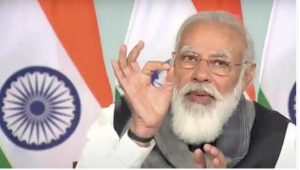The peace process in Afghanistan must preserve the achievements of the past two decades and it must be “led, owned and controlled” by Afghans, Prime Minister Narendra Modi said on Friday. Participating in a virtual bilateral summit with Uzbekistan President Shavkat Mirziyoyev, Modi also said the two countries are committed to the fight against terrorism and have a similar approach towards regional security issues.
“We agree that the restoration of peace in Afghanistan requires a process that is led, owned and controlled by Afghanistan itself. It is also necessary to preserve the achievements of the last two decades,” he said, speaking in Hindi.

India and Uzbekistan, he said, have “similar concerns about extremism, fundamentalism and separatism”. He added, “We both stand firmly together against terrorism.”
The security partnership between the two sides is becoming a strong pillar of bilateral relations and the first joint military exercise was held last year, Modi said. Joint efforts are also increasing in space and atomic energy, he said.
“It is also a matter of satisfaction that during this difficult time of the Covid-19 pandemic, both countries fully supported each other, whether it was supplying medicines or returning each other’s citizens home safely,” he said.
Mirziyoyev, in his opening remarks, endorsed the Indian prime minister’s comments on common threats and challenges and the need for a peaceful settlement in Afghanistan. He also said the two sides should synchronise their positions on countering the impacts of the pandemic.
India sees Central Asia as part of “extended neighbourhood” and forged a strategic partnership with Uzbekistan in 2011. Shortly after beginning his first term as prime minister, Modi made back-to-back visits to all five Central Asian states in 2015.
Bilateral ties now encompass political and strategic issues, defence and security, trade and investment, energy, science and technology and people-to-people contacts. Indian officials say bilateral trade, worth $247 million a year, is well below potential and both sides have now set a trade target of $1 billion.
A bilateral investment treaty and a preferential trade agreement are in advanced stages of negotiation, and Indian companies have made investments of $61 million in Uzbekistan in recent years, especially in the pharmaceuticals sector.
Uzbekistan is the first Central Asian state to which India has extended lines of credit for development projects. Modi announced a $1-billion line of credit and buyer’s credit for Uzbekistan in 2018, and four proposals in roads, sewerage and IT, amounting to $448 million, have been approved by India.
Civil nuclear energy has also emerged as an important area of cooperation, and the two sides signed an agreement on long-term purchase of uranium by India in January 2019.